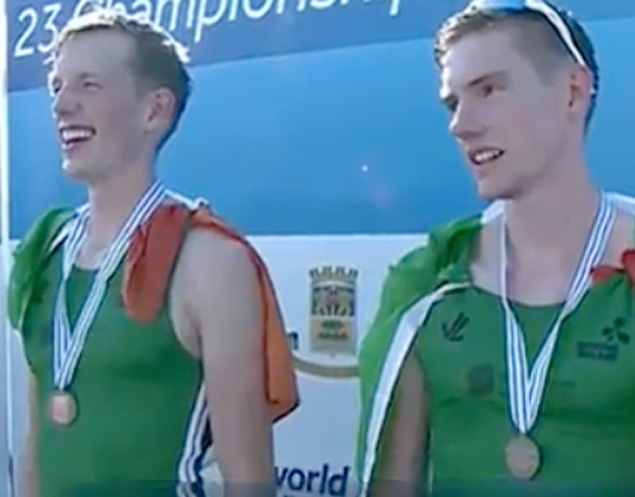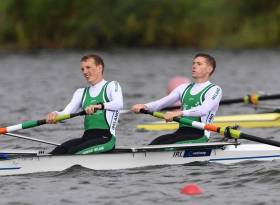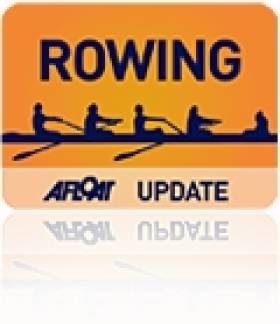Displaying items by tag: David O'Malley
Gold and Silver For Ireland Under-23 Crews on Special Day
#Rowing: Ireland took gold and silver at the World Under-23 Rowing Championships in Poznan, Poland, today. The Ireland lightweight pair of David O’Malley and Shane Mulvaney showed tremendous self-belief to take the gold. Italy seemed set to dominate their final, but Ireland and Greece moved on them before the 1500 metre mark. Italy could not deal with the speed of their opponents and fell back to third. Greece would not give in easily, but Ireland, who took bronze last year, would only settle for the gold and won by two-thirds of a length.
The lightweight quadruple of Miles Taylor, Niall Beggan, Ryan Ballantine and stroke Andrew Goff produced quite a turn of speed to take their silver.
They looked well off the main action in the first half – they were sixth at 1,000 metres. But in the third quarter they charged – and continued that charge to the finish, where only Italy could hold them off.
The women’s pair of Emily Hegarty and Tara Hanlon were out of contention in their B Final. The lightweight double of Lydia Heaphy and Margaret Cremen looked very good in the early stages of their race but faded to fifth and will compete in a B Final.
Ireland have two A Finals to look forward to on Sunday. Ronan Byrne, in the single sculls, and the lightweight double of Fintan and Jake McCarthy both finished second in their semi-finals.
World Under-23 Rowing Championships, Day Four, Poznan, Poland
Men
Lightweight Pair – A Final: 1 Ireland (S Mulvaney, D O’Malley) 6:54.48, 2 Greece 6:56.24, 3 Italy 7:00.07.
Lightweight Quadruple Sculls – A Final: 1 Italy 6:10.13, 2 Ireland 6:11.45, 3 United States 6:12.55.
Lightweight Double Sculls – Semi-Finals (First Three to A Final; rest to B Final) 1 Spain 6:41.66, 2 Ireland (F McCarthy, J McCarthy) 6:42.45, 3 New Zealand 6:44.17.
Single Sculls – Semi-Final (First Three to A Final; rest to B Final): 1 United States (B Davison) 7: 14.65, 2 Ireland (R Byrne) 7:17.88, 3 Germany (M Weber) 7:24.24.
Lightweight Single Sculls – D Final (Places 19 to 24): 2 Ireland (H Sutton) 7:21.95.
Women
Pair – B Final (Places 7 to 12): 6 Ireland (E Hegarty, T Hanlon) 7:51.20.
Lightweight Double Sculls – Semi-Finals (First Three to A Final; rest to B Final): 1 Italy 7:24.69, 2 Australia 7:30.08, 3 Greece 7:31.23; 5 Ireland (L Heaphy, M Cremen) 7:47.66.
#Rowing: Ireland’s David O’Malley and Shane Mulvaney took a bronze medal at the World Rowing Under-23 Championships in Plovdiv, Bulgaria today. Italy won a tense race. Turkey led early on, but Italy and Ireland came through fast. With 500 metres to go, Italy had taken the lead with Ireland and Turkey just behind. In the final quarter, Italy secured first with Turkey just rebuffing Ireland to take the silver. Mulvaney and O’Malley had taken bronze a year after just missing out on a medal.
 David O'Malley and Shane Mulvaney with Bronze Medal at World Under-23
David O'Malley and Shane Mulvaney with Bronze Medal at World Under-23
World Under-23 Championships, Plovdiv, Bulgaria (Irish interest)
Men
Lightweight Pair – A Final: 1 Italy 6:33.05, 2 Turkey 6:36.70, 3 Ireland (S Mulvaney, D O’Malley) 6:37.63; 4 Britain 6:45.33, 5 France 6:46.74, 6 Denmark 6:53.36.
Lightweight Double Sculls – Semi-Finals (First Three to A Final; rest to B Final)
Semi-Final One: 1 Denmark 6:18.69, 2 Italy 6:21.85, 3 Germany 6:23.22.
Semi-Final Two: 1 Canada 6:19.88, 2 Spain 6:20.66, 3 South Africa 6:21.69; 4 Ireland (F McCarthy, J McCarthy) 6:22.56, 5 Britain 6:23.77, 6 Poland 6:42.15.
#Rowing: David O’Malley and Shane Mulvaney won their repechage at the World Under-23 Championships in Plovdiv in Bulgaria today and qualified for the A Final of the lightweight pair. The UCD men led the field through the race, with only France staying close. The two finished in that order, and both qualified for Saturday’s decider.
World Under-23 Day Championships, Plovdiv, Bulgaria, Day Two (Irish interest)
Men
Lightweight Pair – Repechage (First Two to A Final; rest to B Final): 1 Ireland (S Mulvaney, D O’Malley) 6:37.47, 2 France 6:40.28.
Lightweight Double Sculls – Heat Four (First to A/B Semi-Final; rest to Repechage): 1 Ireland (F McCarthy, J McCarthy) 6:22.85; 2 Poland 6:27.26.
#Rowing: Ireland’s lightweight quadruple won their heat at the World Rowing Under-23 Championships in Plovdiv in Bulgaria today. The crew of Niall Beggan, Stephen O’Connor, Andrew Goff and Shane O’Connell gave an outstanding performance. They outpaced early rivals Denmark, and when Britain challenged in the second half they more than matched them to win by 2.73 seconds. Britain and third-placed Spain qualified directly for the semi-finals.
David O’Malley and Shane Mulvaney finished second in their heat and must come through a repechage on Thursday to make the A Final of the lightweight men’s pair. The winner of each heat would qualify for the A Final. Ireland’s crew looked well in contention as they disputed the lead with Italy until 1,000 metres. But the Italy crew upped their rate and left Ireland behind. Their winning time was almost 12 seconds faster than the crew which won the second heat, Britain.
World Rowing Under-23 Championships, Plovdiv, Bulgaria (Irish interest)
Men
Lightweight Pair – Heat One (First to A Final; rest to Repechage): 1 Italy 6:41.77; 2 Ireland (S Mulvaney, D O’Malley) 6:47.52.
Lightweight Quadruple Sculls – Heat One (First Three to A/B Semi-Finals; rest to Repechage): 1 Ireland (N Beggan, S O’Connor, A Goff, S O’Connell) 5:59.39, 2 Britain 6:02.12, 3 Spain 6:03.16.
#ROWING: Eimear Lambe and Jasmine English qualified directly for the semi-finals of the women’s double sculls at the European Junior Rowing Championships in Hazewinkel in Belgium today. The Ireland crew finished second to Romania and will compete next tomorrow morning.
Ireland’s three other crews must compete in repechages. The men’s double of Conor Carmody and David O’Malley finished fourth in their heat; while the junior men’s pair of David and Brian Keohane fifth and single sculler Erin Barry both finished fifth.
European Junior Rowing Championships, Hazewinkel, Belgium (Irish interest):
Men
Pair – Heat Two (First Two Directly to A/B Semi-Finals: 5 Ireland (D Keohane, B Keohane) 7:30.39.
Double Sculls – Heat Three (First directly to A/B semi-finals): 4 Ireland (C Carmody, D O’Malley) 6:56.91.
Women
Double Sculls – Heat One (First Two Directly to A/B Semi-Finals): 2 Ireland (J English, E Lambe) 7:54.10.
Single Sculls – Heat Three (First Two directly to A/B Semi-finals): 5 Ireland (E Barry) 8:38.33.




























































